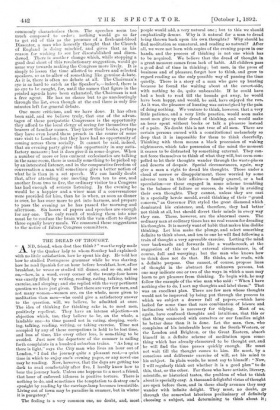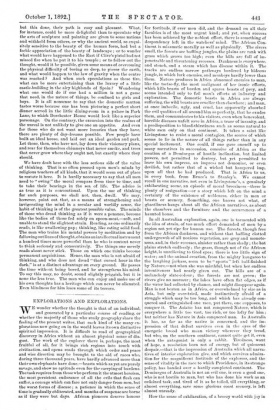THE DREAD OF THOUGHT.
" AND, friend, when dost thee think P " was the reply made by the Quaker lady to whom Southey had explained, with no little satisfaction, how he spent his day. He told her how he studied Portuguese grammar while he was shaving, how he read Spanish for an hour before breakfast, how, after breakfast, he wrote or studied till dinner, and so on, and so on,—how, in a word, every corner of the twenty-four hours was exactly filled by writing, reading, eating, talking, taking exercise, and sleeping ; and she replied with the very pertinent question we have just given. That there are very few men, and not many women—women are, on the whole, more given to meditation than men—who could give a satisfactory answer to the question, will, we believe, be admitted at once. The idea of thinking for thinking sake is, to most men, positively repellent. They have an intense objection—an objection which, too, they believe to be, on the whole, a laudable one—to time passed not in eating, sleeping, work- ing, talking, reading, writing, or taking exercise. Time not occupied by any of these occupations is held to be lost time, and loss of time, like every other loss, is something to be avoided. Jast now the departure of the summer is calling forth complaints in a hundred suburban trains. "As long as there is light," says the City man who lives an hour out of London, " I find the journey quite a pleasant rest,—a quiet time in which to enjoy one's evening paper, or any novel one may be reading. Now, however, that the days are getting too dark to read comfortably after five, I hardly know how to bear the journey back. Unless one happens to a meet a friend, that hour of enforced idleness is positive torture. There is nothing to do, and sometimes the temptation to destroy one's eyesight by reading by the carriage-lamp becomes irresistible. Living out of town may be paradise in summer, but in winter it is purgatory."
The feeling is a very common one, no doubt, and, most
people would add, a very natural one ; but to this we should emphatically demur. Why is it natural for a man to dread being thrown back upon his own thoughts P Why should he find meditation so unnatural, and reading so natural? After all, we were not born with copies of the evening papers in our hands, and the process of thinking is not one which has to be acquired. We believe that the dread of thought in a great measure comes from lack of habit. All children pass a good deal of time in thinking ; but men, in the press of business and of pleasure, forget how to think, and grow to regard reading as the only possible way of passing the time quietly. There is a story of a man who gave up hunting because he found the waiting about at the covert-side, with nothing to do, quite unbearable. If he could have had a book to read till the hounds got away, he would have been happy, and would, he said, have enjoyed the run. As it was, the pleasure of hunting was outweighed by the pain of doing nothing. We venture to think, however, that a very little patience, and a very little practice, would soon make most men give up their dread of thinking, and would make an hour spent without books or talk a pleasure instead of a pain. No doubt this is not true of all men. There are certain persons cursed with a constitutional melancholy so deep that it is impossible for them to think cheerfully. Thinking with them means a black procession of waking nightmares, which take possession of the mind the moment it ceases to be distracted by something external. They can- not force themselves to think of what they will, but seem com- pelled to let their thoughts wander through the waste-places and deserts of despair. Special circumstances, again, may give a man a right to dread his thoughts. Those under a cloud of sorrow or disappointment, those worried by some adverse turn in their affairs—a family quarrel, or a bad speculation—or those engaged in some scheme trembling in the balance of failure or success, do wisely in avoiding their own thoughts. They cannot, unless they are cast in a specially heroic mould, avoid thinking of their " grand concern," as Governor Pitt styled the great diamond which dominated his existence, and, therefore, they had better • not think at all, but should divert their minds in every way they can. These, however, are the abnormal cases. The ordinary man at ordinary times has no real reason for dreading his thoughts. It is merely want of habit that makes him dislike thinking. Let him make the plunge, and select something definite to think about, and ten to one he will find following a train of thought a very agreeable exercise. Letting the mind veer backwards and forwards like a weathercock, at the suggestion of this or that external circumstance, is, of course, dull and worrying; but the man who knows how to think does not do that. He thinks, as he reads, with a definite purpose. One cannot, of course, propose lines of thought in the abstract for unknown persons, but one may indicate one or two of the ways in which a man may learn to get pleasure from thinking. To begin with, he may follow the example of the wise man who said: " When I have nothing else to do, I sort my thoughts and label them." That was an excellent plan. There are few men whose thoughts would not be improved by being put through the process to which we subject a drawer full of papers,—which have lacked for some time that rare combination of leisure and inclination which is necessary for tidying. Most of us, again, have confused thoughts and intuitions, that this or that thing connected with ourselves or our families might be better done than it is done. Let the man. then, who complains of his intolerable hour on the South-Western, or the London and Brighton, or the Great Eastern, absorb himself in a definite scheme of meditation upon some- thing which has already clamoured to be thought out, and he will find the time passes quickly enough. He must not wait till the thought comes to him. He must, by a conscious and deliberate exercise of will, set his mind to his subject. In plain words, he must say to himself : " Now, I will regularly think out whether it is a good plan" to do this, that, or the other. For those who have artistic, literary, scientific, or historical tastes, the problem of what to think about is specially easy. A thousand delightful vistas of thought are open before them, and in these shady avenues they may wander with infinite delight. They must, no doubt, go through the somewhat laborious preliminary of definitely choosing a subject, and determining to think about it;
but this done, their path is easy and pleasant. What, for instance, could be more delightful than to speculate why the arts of sculpture and painting are given to some nations and withheld from others, or why the ancient world, so exqui- sitely sensitive to the beauty of the human form, had but a feeble appreciation of the beauty of landscape ; or to wonder what would have happened to the East if Clive's pistol bad not missed fire when he put it to his temple ; or to follow out the thought, would it be possible, given some means of overcoming the physical difficulty of boring so deep, to pierce the earth, and what would happen to the law of gravity when the centre was reached P And when such speculations as these tire, what can be more entertaining than the luxury of a little castle-building in the airy highlands of Spain P Wondering what one would do if one had a million is not a game that need, in the nature of things, be confined to girls and boys. It is all nonsense to say that the domestic mutton tastes worse because one has been picturing a perfect short dinner served in the little dining-room in a palace in Park Lane, to which Dorchester House would look like a superior parsonage. On the contrary, the excursion into the realms of the unreal is not unlikely to give one an appetite. And even for those who do not want more luxuries than they have, there are plenty of day-dreams possible. Few people have built an ideal house, and laid out an ideal garden and park. Let those, then, who have not, lay down their visionary plans, and rear for themselves chimneys that never smoke, and trees that never grow where they ought not, but exactly where they should.
We have dealt here with the less serious side of the value of thinking. That is so often pressed upon men's minds by religions teachers of all kinds, that it would seem out of place to restate it here. It is hardly necessary to say that all men need to " swing " the moral compass from time to time, and to take their bearings in the sea of life. The advice is as true as it is conventional. Upon the use of thinking for such purposes, we shall not, then, dwell. We may, however, point out that, as a means of strengthening and invigorating the mind in a secular and worldly sense, the habit of thinking is of the greatest possible value. The minds of those who dread thinking as if it were a penance, become like the bodies of those fed solely on spoon-meat,—soft, and -unable to stand the slightest strain. Reading, as one ordinarily reads, is like swallowing pap ; thinking, like eating solid food. The man who trains his mental powers by meditation and by following outlines of thought, obtains an intellectual instrument a hundred times more powerful than he who is content never to think seriously and consecutively. The things one merely reads about never stick. Those on which one thinks become permanent acquisitions. Hence, the man who is not afraid of thinking, and who does not dread " that cursed hour in the dark," is at a distinct advantage on every ground. He passes the time without being bored, and he strengthens his mind. To say this may, no doubt, sound slightly priggish, but it is none the less true. The man who can enjoy and make use of his own thoughts has a heritage which can never be alienated. Even blindness for him loses some of its terrors.



































 Previous page
Previous page